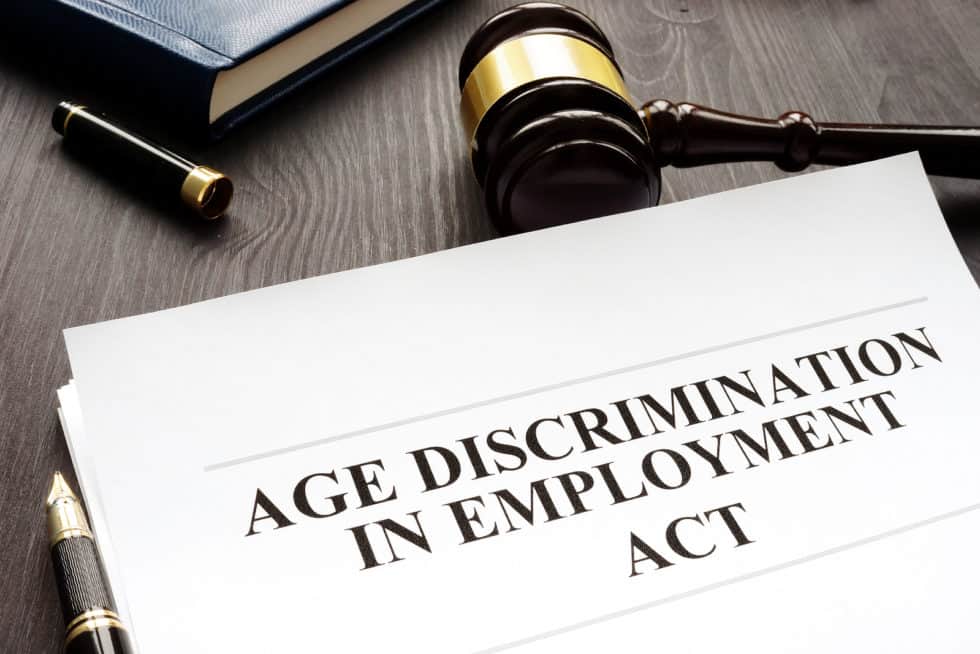Attorney advertisement by Edwin Aiwazian of Lawyers for Justice, P.C., headquartered at 450 N Brand Blvd, Glendale, CA 91203
Age discrimination is when an employee or job applicant is looked upon less favorably due to their age. Since 1967, the Age Discrimination in Employment Act (ADEA) has protected workers from discrimination and harassment; it protects job applicants/employees who are over age 40. The ADEA applies to private employers with 20 or more employees and that engage in interstate commerce; federal, state, and local government agencies; and labor organizations with at least 25 members.
Your Los Angeles employment attorney can prove age discrimination under the ADEA using one of these two theories:
Disparate Treatment Theory: The employee must prove they were intentionally discriminated against because of their age. It must also be shown they are qualified for the job, have experienced an adverse employment action (firing, demotion, or change in terms or conditions of employment), and the employer’s actions can be inferred as discrimination, such as hiring a younger person in their place. In other words, it must be proven an adverse action would not have occurred if it weren’t for the person’s age.
The employer can then produce the evidence needed to prove its actions were non-discriminatory. Next, the employee can then say the employer’s reason was false or was a pretext for discrimination. An employer’s defenses may include a worker’s poor job performance, failure to follow instructions, or meet certain job goals; these often must be challenged during an age discrimination case.
Disparate Impact Theory: One does not have to prove intentional discrimination took place. The goal instead is to demonstrate certain work practices are negatively impacting older employees. A disparate impact theory claim must show an employer’s actions and practices have the potential to harm older workers. It must also apply to groups of workers. For example, if the employer is performing screening tests to determine who to lay off.
To defend against the claim, an employer may try to show the challenged action is based on factors such it pertaining to job performance or a business necessity, rather than age. Your employment law attorney will evaluate your employer’s defense. If it can be argued that age played a role in an adverse action you experienced, they can start building your case.
How Do I Know I’ve Experienced Age Discrimination at Work?
Age discrimination can take many forms. An adverse action against an employee may include termination, refusal to hire, paying a lower salary, denying promotion or benefits, refusing to train, or otherwise altering the conditions of employment. Harassment, including frequent offensive remarks about age, hostility, or creating an offensive work environment, is against the law as well. Other violations include eliminating your position only to hire a younger employee for the same type of work, receiving unfair discipline, or being put on a performance improvement plan yet you’ve had strong reviews.
Building the Evidence
Proving age discrimination requires being thorough. Simply feeling you have been treated unfairly is not enough. But if you continue to document instances of discrimination, including accounts from witnesses, then you can have a stronger case. It’s important to act quickly. An employee can file a charge of discrimination with the Equal Employment Opportunity Commission (EEOC) up to 180 days after an adverse action. In California, the Department of Fair Employment and Housing will accept charges up to 300 days later.
Contact Lawyers for Justice Today
At Lawyers for Justice, P.C., we fight for anyone who experiences illegal actions by their employer, including age discrimination, retaliation, and other violations. We specialize in workplace harassment, wrongful termination, wage and hour, and other forms of employment law; holding employers accountable; and getting our clients compensated. Call 818-JUSTICE for your free consultation.
Attorney advertisement by Edwin Aiwazian of Lawyers for Justice, P.C., headquartered at 450 N Brand Blvd, Glendale, CA 91203
Think you deserve justice?
-
Get a Free Case Evaluation
-
Retain Service with No Upfront Cost
-
Get the Justice You Deserve
-
No Win, No Pay









